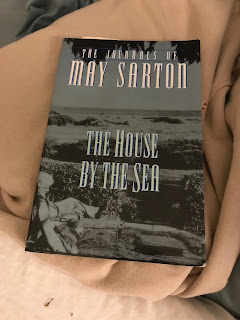 |
| photo by amy |
"Somewhere, something incredible is waiting to be known." Carl Sagan
As recently as a couple years ago, I almost never read nonfiction. I don't know exactly why, but I suspect it relates to my use of reading as a means of escape. Over the last few years, however, I've discovered that nonfiction is often precisely what I need. With that in mind, and following this month's theme of Nonfiction November, here are some of the nonfiction books I've read over the last couple years that I would recommend.
Guns, Germs, and Steel by Jared Diamond: An engaging book providing Diamond's hypothesis for why Western Civilization evolved as it did. This book is so full of interesting facts that I spent almost as much time making notes as I did reading. I loved the PBS series from this book. I've bought
Collapse by Diamond to read but haven't yet gotten to it.
The Year of Magical Thinking by Joan Didion: A memoir of the year directly following the sudden deaths of her husband and concurrent serious illness (and later death) of her daughter. So much of what Didion describes resonates with me because of my experience of my brother's sudden death in an auto accident when he was 16 and I was 21. I also read her later memoir
Blue Nights.
The Grand Design by Stephen Hawking and Leonard Mlodinow: An interesting, approachable, understandable description of different theories about the origin and nature of the universe and humanity's differing historical views of it. I would assume this book might be too basic for most scientists but is a good overview for the rest of us.
Wild and
Dear Sugar by Cheryl Strayed: While both of these books are quite different, I loved the author's voice and points of view in both.
Wild is a memoir of the author's ill-planned hike on the Pacific Coast Trail in the wake of her mother's death and her own divorce.
Dear Sugar is a collection of question and answer advice columns on pretty much everything involved in being human.
The Violinist's Thumb by Sam Kean: My most recently finished nonfiction work is an explanation and history of genetics. While some of the book was a little dry, for the most part, I loved it. Lots of interesting tidbits of info on the underlying stuff of life on this planet. My favorite part was on epigenetics. I have Kean's
Disappearing Spoon, which explores chemistry, to read soon.
When You Are Engulfed in Flames and
Let's Explore Diabetes With Owls by David Sedaris: I listen to all of Sedaris's books on audio, narrated by him on my iPhone on long car trips. The vignettes move from the hilarious, to the disturbing, to occasionally ho-hum, but are very often emotionally moving. As I have lived in North Carolina my entire life, I feel like I'm hearing stories from an eccentric neighbor when I listen to him. My favorite of his collections has been
Dress Your Family in Corduroy and Denim.
My current nonfiction read is
Spillover: Animal Infections and the Next Human Pandemic by David Quammen, which explores the history and reflects on the future of zoonotic diseases. I'm enjoying this one a lot and have his earlier work,
The Song of the Dodo: Island Biogeography in an Age of Extinctions to read soon.
Now that I've discovered the joy of nonfiction and the limitless, free education available to those who choose to pursue it, I try to keep a work of nonfiction underway concurrently with the novels I read. I find these works a nice change of pace perfectly complementing my fiction reading. Happy Nonfiction November!





